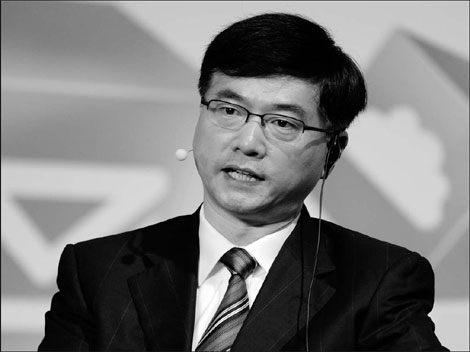China Mobile adds three cities to 4G test
 0 Comment(s)
0 Comment(s) Print
Print E-mail China Daily, February 29, 2012
E-mail China Daily, February 29, 2012
|
|
|
Li Yue, president of China Mobile Communications Corp, at the Mobile World Congress on Monday in Barcelona, Spain. The telecom company plans to build new, or improve existing, infrastructure in China to begin testing the next generation of network communications technology.[China Daily] |
China Mobile Communications Corp, the parent of the largest telecom carrier in the world measured by subscribers, said it will add three Chinese cities to the locations where it will test its fourth-generation telecommunication technology this year, according to the company president.
Li Yue, president of China Mobile Communications Corp, said Beijing, Tianjin and Qingdao will be included in a large-scale trial of 4G time division long-term evolution technology - which will be capable of transferring greater amounts of data than can be moved over third-generation networks - in China starting this year. The addition brings the total number of cities that will take part in the test to nine.
China Mobile began to try out 4G TD-LTE in six large Chinese cities in January 2011 and plans to officially start a second phase of the trial this year.
"We hope to step up the pace for deploying a TD-LTE network in China," Li said at the Mobile World Congress, which is being held in Barcelona, Spain.
Li said a previous test of the technology in China produced satisfactory results, showing that the network has capabilities that can rival a similar technology - frequency division duplex long-term evolution.
To ensure it can have 20,000 TD-LTE base stations by the end of the year in the nine Chinese cities, China Mobile plans to build new infrastructure or improve existing infrastructure.
"If the expanded large-scale test is successful this year, China Mobile will increase the number of TD-LTE base stations in China to more than 200,000 in 2013," Li said.
And if things progress faster than expected, China Mobile may start acting on the 200,000-station plan as early as the second half of the year, Li said.
Hangzhou and Shenzhen may be the first two Chinese cities to hold commercial tests of the technology this year, Li said.
China Mobile is promoting the use of TD-LTE technology both at home and abroad. Even so, the world has been slow to adopt China's homegrown 4G technology, doing so less quickly than it has embraced the technology's European rival - FDD-LTE.
Five commercial TD-LTE networks have gone into operation in countries such as Saudi Arabia, Japan and Brazil, according to statistics from Global TD-LTE Initiative, an organization whose major task is to support the spread of TD-LTE technology throughout the world. That is far fewer than the 33 FDD-LTE commercial networks that have been deployed around the world.
"At present, the existing TD-LTE commercial networks are relatively small," said Li Zhengmao, an executive vice-president with China Mobile. "Global partners are calling for a bigger player to push the technology forward. Otherwise, they will be reluctant to take risks and give it a try."
He said it is important for China Mobile to step up and start the commercial use of TD-LTE technology.
Good news, meanwhile, came for China Mobile at the 2012 Mobile World Congress: Qualcomm Inc and HiSilicon Technologies Co Ltd introduced computing chips that support both the FDD and TD-LTE technologies.
"These chipsets will prompt the manufacture of large numbers of smartphones that can connect to a TD-LTE network, and lead to the possibility of the first TD-LTE version of Apple Inc's iPhone," the executive vice-president said.
Separately, China Mobile plans to introduce a converged TD/FDD-LTE network this year in Hong Kong and to start providing commercial services on that network in 2012.







Go to Forum >>0 Comment(s)